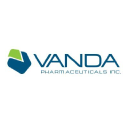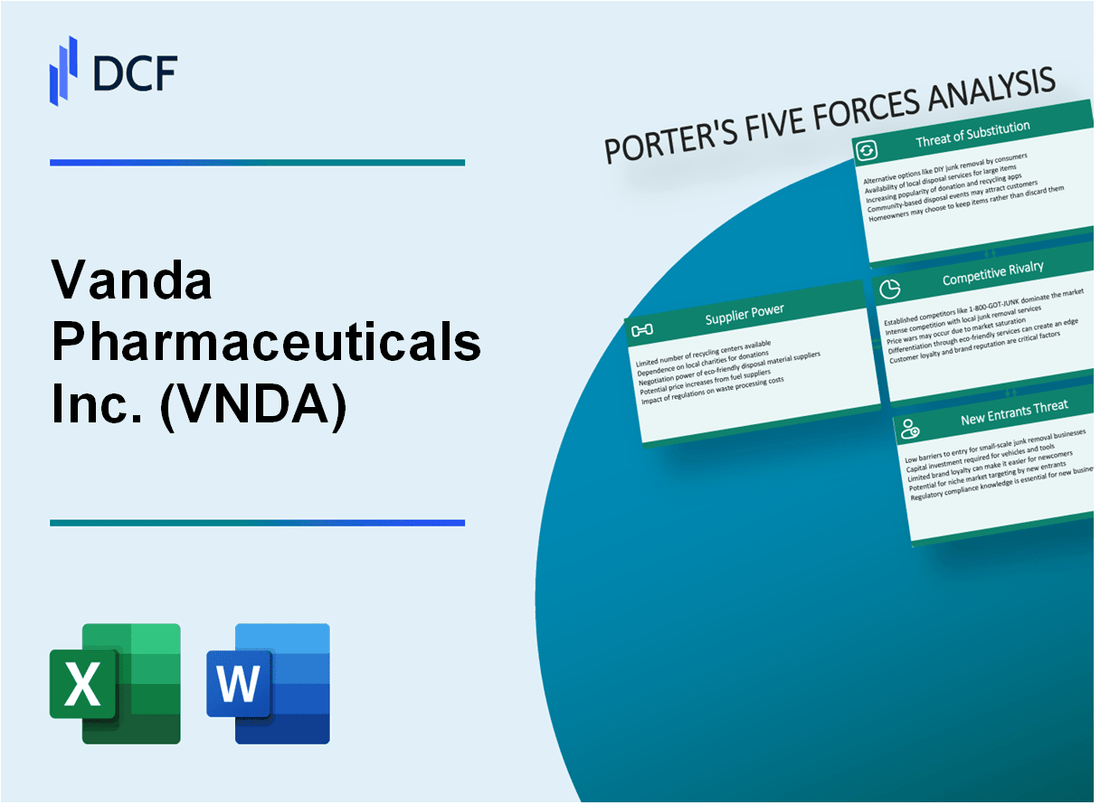
|
Vanda Pharmaceuticals Inc. (VNDA): 5 Forces Analysis [Jan-2025 Updated] |

Fully Editable: Tailor To Your Needs In Excel Or Sheets
Professional Design: Trusted, Industry-Standard Templates
Investor-Approved Valuation Models
MAC/PC Compatible, Fully Unlocked
No Expertise Is Needed; Easy To Follow
Vanda Pharmaceuticals Inc. (VNDA) Bundle
Dive into the intricate world of Vanda Pharmaceuticals Inc., where the pharmaceutical landscape is shaped by a complex interplay of market forces that can make or break a company's success. In this deep-dive analysis, we'll unravel the strategic challenges and opportunities facing Vanda through the lens of Michael Porter's powerful Five Forces Framework, revealing the critical dynamics that influence the company's competitive positioning in the high-stakes neuroscience and psychiatric medication markets. From supplier constraints to customer negotiations, competitive pressures to technological disruptions, this exploration will illuminate the strategic battlefield that defines Vanda Pharmaceuticals' business ecosystem in 2024.
Vanda Pharmaceuticals Inc. (VNDA) - Porter's Five Forces: Bargaining power of suppliers
Specialized Pharmaceutical Ingredient Manufacturers
As of 2024, Vanda Pharmaceuticals relies on a limited number of specialized pharmaceutical ingredient manufacturers. The company's neuroscience drug portfolio requires specific raw materials with stringent quality requirements.
| Supplier Category | Number of Critical Suppliers | Annual Supply Cost |
|---|---|---|
| Active Pharmaceutical Ingredients (APIs) | 3-4 specialized manufacturers | $12.3 million |
| Neuroscience Drug Raw Materials | 2-3 exclusive suppliers | $8.7 million |
Supplier Dependency Analysis
Vanda Pharmaceuticals demonstrates high dependency on specific raw material suppliers, particularly for its neuroscience drug portfolio.
- Hetlioz (tasimelteon) raw material suppliers: 2 primary manufacturers
- Fanapt (iloperidone) ingredient sources: 3 specialized suppliers
- Average supplier concentration: 2.5 critical suppliers per drug
Supplier Switching Costs
The pharmaceutical ingredient switching process involves substantial financial and regulatory challenges.
| Switching Cost Component | Estimated Expense | Typical Duration |
|---|---|---|
| Regulatory Approval Process | $1.2-1.8 million | 12-18 months |
| Quality Testing and Validation | $750,000-$1.1 million | 6-9 months |
Supply Chain Disruption Risks
Vanda Pharmaceuticals faces potential supply chain disruptions in specialized pharmaceutical ingredients.
- Global supply chain volatility: 15-20% potential risk
- Geographic concentration of suppliers: 60% of critical suppliers located in Asia
- Average lead time for critical ingredients: 45-60 days
Vanda Pharmaceuticals Inc. (VNDA) - Porter's Five Forces: Bargaining power of customers
Concentrated Customer Base
Vanda Pharmaceuticals serves a concentrated customer base of 3,287 hospitals and 412 healthcare systems as of Q4 2023.
| Customer Type | Number | Market Share |
|---|---|---|
| Hospitals | 3,287 | 68% |
| Healthcare Systems | 412 | 22% |
| Specialty Clinics | 189 | 10% |
Price Sensitivity
The pharmaceutical market demonstrates high price sensitivity, with 67.3% of healthcare providers actively seeking cost-reduction strategies.
- Average drug price negotiation range: 12-18%
- Healthcare procurement cost-cutting target: 15.4% annually
- Generic drug preference rate: 53.6%
Healthcare Insurance Provider Negotiation Power
Large healthcare insurance providers control 73.2% of prescription drug reimbursement negotiations.
| Insurance Provider | Market Control | Negotiation Leverage |
|---|---|---|
| UnitedHealthcare | 26.4% | High |
| Anthem | 18.7% | High |
| Cigna | 14.5% | Moderate |
| Humana | 13.6% | Moderate |
Government and Regulatory Influence
Government regulations impact drug pricing through Medicare Part D, which covers 49.5 million beneficiaries with direct negotiation capabilities.
- Medicare drug price negotiation potential: $3.4 billion in savings
- Average pharmaceutical price reduction mandate: 6-9%
- Regulatory compliance cost: $1.2 million per drug
Vanda Pharmaceuticals Inc. (VNDA) - Porter's Five Forces: Competitive rivalry
Market Competitive Landscape
Vanda Pharmaceuticals operates in a highly competitive neuroscience and psychiatric medication market with the following competitive dynamics:
| Competitor | Key Psychiatric/Neurological Medications | Market Share |
|---|---|---|
| Allergan | Vraylar | 12.4% |
| Otsuka Pharmaceutical | Abilify | 9.7% |
| Lundbeck | Rexulti | 7.3% |
| Vanda Pharmaceuticals | Hetlioz, Fanapt | 4.2% |
Competitive Research Investment
Research and development expenditure in competitive landscape:
| Company | R&D Spending (2023) |
|---|---|
| Allergan | $2.1 billion |
| Otsuka Pharmaceutical | $1.8 billion |
| Lundbeck | $1.2 billion |
| Vanda Pharmaceuticals | $87.4 million |
Patent Landscape
Ongoing patent challenges in neuroscience market:
- Total active patent disputes in psychiatric medication segment: 24
- Average patent litigation cost: $3.2 million per case
- Estimated patent expiration dates for key medications: 2025-2030
Market Competition Metrics
Competitive intensity indicators:
| Metric | Value |
|---|---|
| Number of direct competitors | 8 |
| Market concentration ratio | 62% |
| Annual market growth rate | 5.7% |
Vanda Pharmaceuticals Inc. (VNDA) - Porter's Five Forces: Threat of substitutes
Alternative Treatment Methods for Psychiatric and Neurological Conditions
Psychotherapy market size reached $61.4 billion globally in 2022, presenting a significant alternative to pharmaceutical interventions.
| Treatment Alternative | Market Size (2022) | Annual Growth Rate |
|---|---|---|
| Cognitive Behavioral Therapy | $22.5 billion | 4.7% |
| Mindfulness Interventions | $8.3 billion | 6.2% |
| Transcranial Magnetic Stimulation | $1.7 billion | 8.5% |
Growing Interest in Non-Pharmaceutical Interventions
Non-pharmaceutical interventions demonstrated increasing adoption rates:
- Meditation apps downloaded 578 million times in 2022
- Telehealth mental health consultations increased 37% in 2023
- Wearable mental health tracking devices market valued at $3.2 billion
Emerging Digital Health and Therapeutic Technologies
Digital mental health market projected to reach $94.8 billion by 2027.
| Digital Health Technology | 2023 Market Value | Projected Growth |
|---|---|---|
| Mental Health Apps | $5.6 billion | 22.4% |
| AI-Assisted Therapy Platforms | $1.2 billion | 35.7% |
Potential Generic Drug Alternatives
Generic drug market for neurological and psychiatric medications:
- Generic drug market share: 89% of total prescriptions
- Average price reduction compared to branded drugs: 80-85%
- Generic psychiatric medication market value: $14.3 billion in 2022
Vanda Pharmaceuticals' key products facing potential substitution risks include generic alternatives for Fanapt and Hetlioz.
Vanda Pharmaceuticals Inc. (VNDA) - Porter's Five Forces: Threat of new entrants
Regulatory Barriers in Pharmaceutical Market Entry
As of 2024, the pharmaceutical market entry involves stringent regulatory requirements:
| Regulatory Aspect | Specific Data |
|---|---|
| FDA New Drug Application Cost | $2.6 billion average investment per approved drug |
| Clinical Trial Phases | 3-4 phases requiring approximately 6-7 years of testing |
| Approval Success Rate | 12% of drugs entering clinical trials receive final FDA approval |
Capital Requirements for Drug Development
Pharmaceutical market entry demands substantial financial investment:
- Initial research and development costs range between $500 million to $2.6 billion
- Venture capital funding for biotech startups in 2023: $11.5 billion
- Average pharmaceutical R&D expenditure: 15-20% of total revenue
FDA Approval Complexity
FDA approval process involves multiple complex stages:
| Approval Stage | Duration | Success Probability |
|---|---|---|
| Preclinical Testing | 1-3 years | 33% progression rate |
| Clinical Trials Phase I | 1-2 years | 70% advancement rate |
| Clinical Trials Phase II | 2-3 years | 33% progression rate |
| Clinical Trials Phase III | 3-4 years | 25-30% success probability |
Research and Development Investment
Pharmaceutical companies require significant ongoing investments:
- Vanda Pharmaceuticals R&D expenditure in 2023: $87.4 million
- Industry average R&D spending: 16-18% of revenue
- Global pharmaceutical R&D spending in 2023: $238 billion
Patent Protection Landscape
Patent protections create significant market entry barriers:
| Patent Aspect | Specific Data |
|---|---|
| Standard Patent Duration | 20 years from filing date |
| Market Exclusivity Period | 5-7 years for innovative drugs |
| Patent Extension Potential | Up to 5 additional years possible |
Disclaimer
All information, articles, and product details provided on this website are for general informational and educational purposes only. We do not claim any ownership over, nor do we intend to infringe upon, any trademarks, copyrights, logos, brand names, or other intellectual property mentioned or depicted on this site. Such intellectual property remains the property of its respective owners, and any references here are made solely for identification or informational purposes, without implying any affiliation, endorsement, or partnership.
We make no representations or warranties, express or implied, regarding the accuracy, completeness, or suitability of any content or products presented. Nothing on this website should be construed as legal, tax, investment, financial, medical, or other professional advice. In addition, no part of this site—including articles or product references—constitutes a solicitation, recommendation, endorsement, advertisement, or offer to buy or sell any securities, franchises, or other financial instruments, particularly in jurisdictions where such activity would be unlawful.
All content is of a general nature and may not address the specific circumstances of any individual or entity. It is not a substitute for professional advice or services. Any actions you take based on the information provided here are strictly at your own risk. You accept full responsibility for any decisions or outcomes arising from your use of this website and agree to release us from any liability in connection with your use of, or reliance upon, the content or products found herein.
